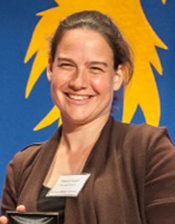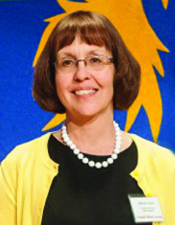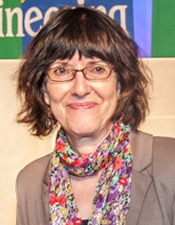Celebration of Education
Awards Honor Magnificent Mentors, Terrific Teachers
By Kelly Saavedra
You always remember the teachers or advisers who helped shape who you are today.
They saw your potential before you did, and nurtured it without fail. They listened patiently and offered expert guidance. They made recommendations that expanded your career possibilities. They helped pick up the pieces when everything seemed to be falling apart.
At this year’s Celebration of Education, CMU paid tribute to the extraordinary efforts and achievements of four distinguished educators for their unparalleled commitment to helping others succeed.
And this year’s winners are:
Rebecca Nugent
The William H. and Frances S. Ryan Award for Meritorious Teaching
 Rebecca Nugent is a demanding instructor and mentor known for her high standards and profound impact on students.
Rebecca Nugent is a demanding instructor and mentor known for her high standards and profound impact on students.
She is co-director of the fast-growing undergraduate program in the Department of Statistics, where she has helped shepherd the growth of the undergraduate statistics major and advised innumerable students toward careers in the field.
Nugent teaches a wide variety of statistical methodology classes at CMU but is probably most famous for forcing everyone to rewrite their data analysis reports several times. Students flock to her for advice and write about her ability to engage them both in and out of the classroom.
“Rebecca’s classroom teaching is simply inspirational,” wrote her nominators, professors Joel Greenhouse, Brian Junker and Mark Schervish.
Nugent actively tries to incorporate challenges and contests into every course she teaches and encourages students to try to surprise her. She expects all her students to try their best and to contribute, and she sincerely believes that every student has something to offer. This kind of personal interaction contributes to the overall sense of community that she builds in her classroom.
Nugent is fearless when it comes to revising courses to meet the diverse needs of her students. She has changed exam formats to accommodate her students’ varying levels of programming skills, leveling the playing field and, rewarding preparation.
She revised and renamed the Modern Regression capstone course, introducing modern statistical methods with an emphasis on experiential learning and balancing the practice of statistics with theory. In fall 2006, when she first taught the course, there were 25 students. In fall 2014, 131 students were enrolled.
“We are all familiar with, not to mention intimidated by, the challenges of teaching large introductory courses,” her nominators wrote. “Few of us, however, have had to confront the unique challenges of teaching large upper level courses. Rebecca has done this repeatedly and makes it look easy.”
She recognizes the importance of interacting with real data for training. As a result, almost all of her courses involve writing exams or projects that use large data sets from real research projects.
Every semester she searches for appropriate data sets, cleans and analyzes the data, does the background research on the problem, and writes a structured exam/project based on the data. She writes at least 10 of these a year and rarely uses the same data set twice. She has collected these research problems/data sets into an easily searchable library that is quickly becoming a fantastic resource for other instructors to use both at CMU and at other universities.
Bonnie Olson
The Award for Outstanding Contributions to Academic Advising and Mentoring
 She’s the glue that holds the mechanical engineering undergraduate program together, according to colleagues who nominated Bonnie Olson for the Academic Advising Award.
She’s the glue that holds the mechanical engineering undergraduate program together, according to colleagues who nominated Bonnie Olson for the Academic Advising Award.
Before Olson joined the Department of Mechanical Engineering in 2003, faculty members were responsible for all undergraduate advising. But as the department grew, it had become increasingly clear that students would be better served if someone solely dedicated to advising helped carry the load.
Olson was the right person at the right time, her colleagues said, and she quickly exceeded expectations, developing the position far beyond the original plan.
Some describe her ability to serve students as “uncanny.”
“Walking across campus with her is to experience an impressive display of memory. She remembers who has had what experience and can make connections between students. She has a large number of advisees, but it seems like she knows them all by name,” said Department Head Allen Robinson, Professor Alan McGaughey and Business Manager Keri Baker, who nominated her for the award.
Olson treats each student as an individual, listening to and understanding their goals and interests and then helping them effectively plan their coursework and other activities — quite the juggling act, as it can include double majors, self-defined majors, minors and study abroad.
Olson is an active member of the undergraduate education committee, and is a voice for the students she serves. She spearheaded a student trip to China in 2013, putting in many hours outside of her normal day to make sure everything went as planned. And it did.
She leads the process of nominating students for internal and external awards. And last year, she further reduced the load on faculty by developing an online system to assist with awards-related decision-making.
Olson has developed an advising manual based on her experience and has been an advocate and pioneer for study-abroad programs, expanding opportunities for students and also streamlining the process for them.
Since Olson was hired, the mechanical engineering undergraduate program has doubled in size, and student-reported satisfaction with advising has noticeably risen. Mechanical engineering consistently ranks first or second among CMU’s engineering departments in the annual Undergraduate Advising Survey, and is well above other departments of comparable size.
The college’s Senior Engineering Exit Assessment added a section on advising in 2014, and graduating mechanical engineering students rated advising performance at 95 percent, the highest of all the engineering departments.
“It’s hard to imagine our department operating without Bonnie,” Robinson said.
Jeanne VanBriesen
The Barbara Lazarus Award for Graduate Student and Junior Faculty Mentoring
 From the moment she arrived at CMU in 1999, Jeanne VanBriesen has been networking.
From the moment she arrived at CMU in 1999, Jeanne VanBriesen has been networking.
While advancing through the professorial ranks, she has mentored a growing number of junior faculty members both inside and outside the university, and transformed the academic experience for graduate students who seek her advice and counsel.
“Jeanne is generous with her time and sensitive to the challenges junior faculty face in the competitive funding arena, as well as in their efforts to build meaningful professional and personal success,” wrote Hamerschlag University Professor and Civil and Environmental Engineering Department Head David Dzombak, who nominated her for the award.
VanBriesen has mentored 15 civil and environmental engineering Ph.D. students through the completion of their degrees; 12 were women. When VanBriesen initially met Shannon Isovitch, one of her former Ph.D. students who is now manager of innovation initiatives at Alcoa, Isovitch was working full-time as an engineering consultant, finishing her master’s degree on a part-time basis and considering pursuing a doctoral degree.
VanBriesen helped her to reach that decision.
“Having been outside of the full-time student world for almost 10 years when I began my Ph.D. work, I found it challenging to completely understand and meet expectations,” Isovitch said. “As my adviser, Jeanne provided me with support and inspiration while also letting me find my own way. This often times meant I had to struggle to find answers, but I was better for it in the end.”
VanBriesen has an intensive, student-centered mentoring style that ensures the individual develops both personally and professionally. She helps her students develop their abilities to the fullest and then guides them in deciding how to align their talents with their own goals.
She continues to offer support and mentorship to a number of junior women in engineering and science at CMU, generally through informal coffee and lunch meetings to discuss research, the promotion and tenure process, and balancing the competing demands for time that are so common during the pre-tenure years for faculty.
VanBriesen frequently presents to groups of women on the topics of life in graduate school, advising and mentoring, the academic job search, and juggling work and family.
The Untenured Women Faculty in Engineering lunch meeting VanBriesen co-organized 15 years ago is still going strong at CMU today, although she and all of the original members have technically “graduated” from the group by attaining their tenure at the university.
Carol Frieze
Mark Gelfand Service Award for Educational Outreach
 With a record-breaking number of women in its freshman class this year, Andrew Moore, dean of the School of Computer Science, and several colleagues of Carol Frieze thought it was the perfect time to nominate her for the Mark Gelfand Award for Educational Outreach.
With a record-breaking number of women in its freshman class this year, Andrew Moore, dean of the School of Computer Science, and several colleagues of Carol Frieze thought it was the perfect time to nominate her for the Mark Gelfand Award for Educational Outreach.
Over the past 15 years, Frieze has worked to create and encourage academic, social and professional opportunities for underrepresented groups in computer science through Women@SCS, which she directs, and SCS4ALL, which she co-founded last year.
“Carol engages and encourages the many students of these organizations through her extensive knowledge, experience, gentle guidance, availability and patient listening,” Moore said. “Under her guidance, the students grow into teachers, speakers, leaders, organizers and mentors — professionals in technology who, in turn, pay it forward to others.”
One of Frieze’s signature strengths is her insistence that things are student-run.
“She guides students rather than doing things for them,” Moore added. “She offers them leadership positions and guides them to shine. When asked to speak or present, Carol often gives the opportunity to a graduate student instead.”
At the request of a graduate student 10 years ago, Frieze started TechNights to introduce middle school girls to computer science. Hundreds of middle school girls have since discovered and explored computer science while having fun, and through the program girls meet others interested in technology, sometimes for the first time.
Frieze and her students regularly disperse to share computer science “roadshows” in schools, coffee shops and other venues. Frieze recruits and trains CMU student volunteers in response to requests from schools or programs at museums.
Every other year Frieze brings about 20 graduate and undergraduate CMU students to the Grace Hopper Celebration of Women in Computing Conference. Often Frieze and her students present at Grace Hopper, sharing what they have accomplished at CMU.
Her 10 publications with Lenore Blum, Bernardine Dias, Jeria Quesenberry and others present groundbreaking work in how to understand and increase women’s participation in computer science.
Recently, she co-authored a book with Quesenberry called “From Difference to Diversity: Women in Computing at Carnegie Mellon University,” in which her primary objective was to share the success stories at CMU in the hope that other institutions and schools seeking to improve the underrepresentation of women in computing will have tried and true tools to leverage.
